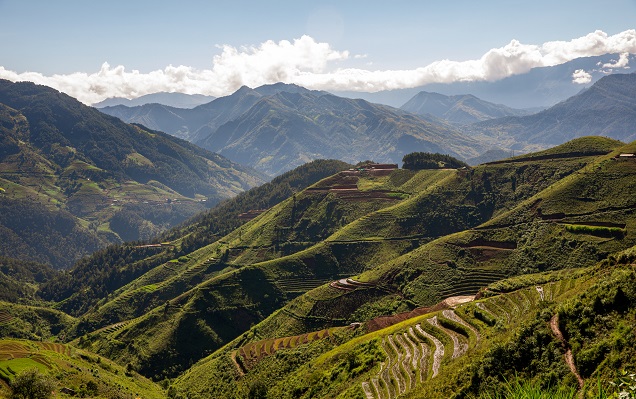Strengthening community-based forest management to protect the Da Bac’ Forests in Viet Nam

Due to its location in the highlands, the Da Bac District in Viet Nam is vulnerable to the negative impacts of climate change, particularly extreme weather events. This IKI Small Grants project aims to counteract the negative impacts of climate change in the region by developing and applying a partnership mechanism for effective forest management in Da Bac District. It empowers local communities, especially ethnic minorities, and other stakeholders, to directly coordinate forest management in the region.
INITIAL SITUATION
Seven rainstorms and tornadoes, 17 storms, and 21 floods have hit the region since 2015, resulting in collapsed houses, destroyed agricultural and forestry land. Under these circumstances, well managed forests are a key component to stabilise land management and to mitigate impacts of weather extremes.
TARGET GROUP
2,500 people are the direct target group of this project, including 50 per cent women. The project targets local communities but also government agencies, non-governmental organisations, and other stakeholders related to forest protection and forest management in Da Bac District.
APPROACH AND ACTIVITIES
This IKI Small Grants project supports threatened marginal communities to practice community forest management and conservation. The project develops and applies a cooperation mechanism among stakeholders to manage and protect effectively the forest in Da Bac District. It aims to improve the capacity of local people, especially ethnic minorities and vulnerable people. It thus enables the target groups to directly coordinate and manage the forest area, protecting it, and apply sustainbale land planning.
To start off, the project organises five training courses for Forest Management Groups. In cooperation with these communities, the project develops participatory management systems that comply with government regulations.
Members of the Forest Management Groups review current forest management regulations and plans as well as the responsibilities of stakeholders. They then develop the forest management plans for the next periods. Based on that, the project identifies activities and responsibilities of stakeholders in forest co-management that suit the local context. As a result, a consensual forest co-management agreement among the Forest Management Groups, local communities, and local authorities is issued and reinforced.
In addition, the project promotes synergies between many different stakeholders such as governmental organisations, non-governmental organisations, and the private sector. Partners on the provincial level include representatives of the Department of Agriculture and Rural Development (DARD), the Department of Natural Resources and Environment of Ho Chi Minh City (DONRE), and the Da River Project Forest Management Board (FMB). On a district level, the project cooperates with the People’s Committee (PC) of Da Bac and the Muong Chieng People’s Committee.
LATEST PROJECT HIGHLIGHTS AND IMPACTS
- Met with Da Bac District’s Forest Protection Division to discuss the project implementation plan and coordination mechanisms for forest management and protection.
- Held a district-level project introduction meeting at Muong Chieng commune’s People’s Committee to explain project goals, expected results, and activities, and selected three villages to participate.
- Organized three village meetings with 158 participants to communicate the project’s support model, establish Forest Management Groups (FMGs), and form cooperative groups for livelihood development. Participants committed to project implementation and understood their roles and benefits.
- Successfully held a course on climate change for 30 FMG members, covering climate change adaptation/mitigation and planning for forest development and forest-based livelihoods.
CAPACITY DEVELOPMENT
IKI Small Grants supports the center for Research on Initiatives of Community Development in their organisational capacity development through:
- Advanced English courses focusing on proposal writing
- Fundraising trainings from private sectors (businesses, philanthropists, and individuals)
- Social communication skills
- Regularly updating RIC’s Website, Fanpage, and Brand Identity
ABOUT THE ORGANISATION
The Center for Research on Initiatives of Community Development (RIC) was established in 2009 as a non-governmental organisation. RIC promotes and develops self-management ecosystems towards inclusive and sustainable development of rural and mountainous communities, especially ethnic minority communities. Its field of work focuses on community-based construction, operation, and maintenance of infrastructure, climate resilience through natural resources governance and developing sustainable livelihood models as well as community education and communication.
